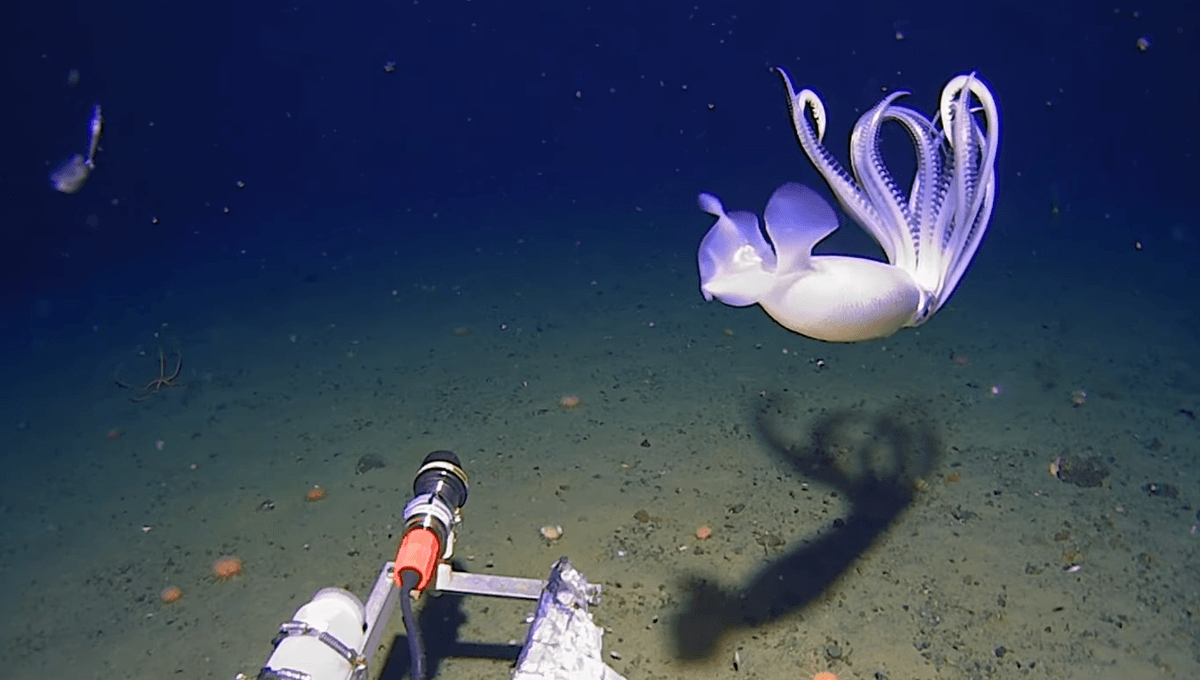
Over 1,000 meters (3,280 feet) beneath the near-frozen water of the Antarctic Peninsula, a collection of squids – each one stranger than the last – have been captured on camera in stunning detail.
The dazzling footage was captured during an expedition by Minderoo-UWA Deep-Sea Research Centre and Inkfish between December 2024 and January 2025.
At a depth of 1,000 meters (3,280 feet), the team’s remotely operated vehicle (ROV) spotted a cephalopod species known as Moratoothopsis longimana, a ghostly white squid with long, elegant tentacles. Sharing the clip on Instagram, they wrote: “Not much is known about this deep-sea species, but its name hints at its unusually long arms. Likely a midwater hunter, it’s a rare observation.”
Around the same depth, they also encountered a Slosarczykovia circumantarctica. This cephalopod has translucent tissue, offering a clear view of its internal organs, including its digestive tract. It’s also equipped with large, luminous eyes, perfect for navigating the pitch-black depths of the ocean where sunlight never reaches.
Described as the “biggest surprise” of the trip, the team also documented Alluroteuthis antarcticus at a depth of 1,500 meters (4,921 feet). One striking scarlet-red individual was even seen clutching captured prey in its tentacles – possibly the mantle of another squid, perhaps even one of its own species.
The Antarctic is home to a range of cephalopods, from the very small 15-centimeter (~6-inch) Brachioteuthis to the very large 4-meter (13-foot) Mesonychoteuthis – the colossal squid. The giant Antarctic octopus also stalks the frigid waters that surround the continent.
Many of these cephalopods have evolved unique physiological traits to survive the sub-zero waters of the Southern Ocean. For instance, the giant Antarctic octopus has specialized blue blood that helps to supply oxygen to tissue at sub-zero temperatures. Other marine species have blood that pumps with antifreeze proteins to help cope with the super-chilled waters.
While dozens of Southern Ocean squid species are known to science, many more are likely to be out there undiscovered, eluding all human contact. Beyond cephalopods, the overall biodiversity of the Southern Ocean is still not fully understood. Its harsh climate and remoteness have long hindered scientific exploration, although recent advances in technology are steadily expanding our knowledge – just like this latest expedition by the Minderoo-UWA Deep-Sea Research Centre.
This team of Australia-based scientists focuses on exploring the deep and often overlooked waters of the Southern Hemisphere, from the icy Southern Ocean to the remote trenches of the Pacific.
Between July and October 2024, they embarked on a mission to explore the Tonga Trench in the southwestern Pacific Ocean and managed to film extremely rare footage of a bigfin squid known for its alien-like appearance and unbelievably long tentacles.
Source Link: In The Near-Zero Depths Of Antarctica, Strange Squids Have Been Caught On Film